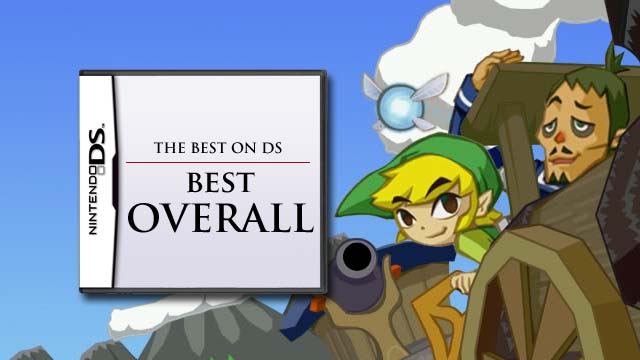
Certainly, we could have conducted a behind-closed-doors debate and democratic vote on what game we think is the best in DS’s library. That’s what we did for all our other awards. Yet recognizing that the best of the system’s entire library is very subjective depending on your favorite kind of games, so we decided the ideal way to choose the best DS games of all time was as individuals in this round table. This also allows each of us to name up to three favorites, ensuring our favorite underdogs (if that’s what they are) get their moment in the sun. We hope you enjoy seeing which writer’s tastes line up with you most– and please tell us your own all-time favorite DS game(s) in the comments below.
Andy Hoover
Most gaming writers would probably agree that having to choose annual “Best of the Year” awards from 365 days’ worth of releases can be an arduous task. Sure, plenty of those games range from inane to mediocre, but a handful or more generally stand heads and shoulders above the rest and picking from among those can be like having to choose your favorite limb. Now, having to do this for a console entire life cycle spanning more than five years, that could drive a gamer to insanity — especially when the console we are talking about has been so innovative, popular, and has delivered such a wide variety of software that has satisfied every facet of my gaming desires.
In order to maintain my health, I am going to make this quick and painless, hopefully. These are three titles that have stuck with me for one reason or another and immediately jump to mind when I start thinking about the many years I have spent with wonderful machine, which started the exact minute it launched and will end when the clock strikes midnight on March 27. In no particular order, here are my picks:
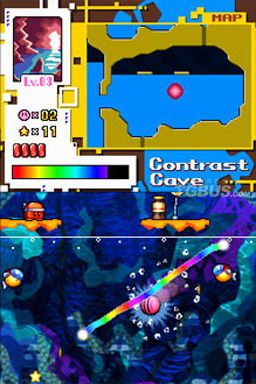
Kirby Canvas Curse — This is the game that made me realize DS’s potential. The platforming mechanics are simple and classic but the means for controlling it all proved how effective and intuitive touch controls could be. Just as important as the innovations is the fact that this is a brilliant game in its own right; the level design is sublime, the graphics capture that classic Kirby charm, and there were loads of amazing and surprisingly diverse content beyond the main campaign. I rarely achieve 100% in a game, but Canvas Curse was simply too perfect to resist.
Pokémon HeartGold — Yes, this is a remake of an old Game Boy Color game, and maybe it is just the nostalgia talking, but I couldn’t put this game down. HeartGold immediately had a leg up on other games due to the fact it had been so amazing in its original form, but it also proved more than capable of standing on its own. The graphics were a noticeable step beyond Diamond/Pearl/Platinum, the story from the original was injected with a great deal more detail and character, and all the new creatures and features introduced since the original were seamlessly integrated into the existing structure. Topping the package off is the Pokéwalker, an amazing device that did a great job of extending the spirit of the franchise beyond traditional boundaries and proved surprisingly addictive.
The World Ends With You — If I absolutely had to choose a favorite I would have to give it to this masterpiece and I would do so with only the slightest of hesitation. No game on DS better illustrated the system’s spirit of innovation; much of the structure was familiar, but the gameplay, visuals, music, and story all represented dramatic departures from the JRPG norms, and each paid out big time. The dual screen battles were challenging yet addictive, powering your character by eating the right food and wearing the right clothing was a game in and of itself, and only the best RPGs can match the writing’s ability to seemingly intermix suspense, drama, and comedy with an amazing cast of distinct, original, and likable characters. I gave this game a perfect score when I reviewed it, and if you ever see my opinion of this game waver, you can take it as a sign of the apocalypse.
There, that’s it. I probably could have debated internally for a while longer and come up with a mostly different selection, but I will be able to rest easy knowing that each of these titles deserve more praise than I could ever pack into so few paragraphs.
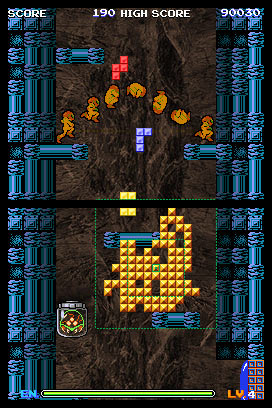 Aaron Roberts
Aaron Roberts
I’m going to step outside the box here and pick just one game for my game of the system for DS, and since SOMEONE already picked three good ones, I’m going to go with Tetris DS.
Nintendo made Tetris the must-have handheld game on the original Game Boy, and the DS iteration more than lived up to its predecessor’s legacy. The main game of Tetris is only the tip of the iceberg, there are more modes than ever seen previously, including some that really push the envelope, like Samus’s “Catch” mode. The 8-bit throwback style also salutes the history of the NES, making this the ultimate version of Tetris for Nintendo fans and, with a robust online framework, arguably for anyone.
If you’re looking for the one game to have on a desert island, this might be it, especially once you’ve unlocked Endless mode, and even if there is more than one person with a DS, you can all play with just the one Game Card. There are a ton of fantastic DS games, but this is definitely the cream of the crop.
Joshua Johnston
As the Editor-in-Chief so sagely pointed out in the introduction, a list like this will inevitably be colored by one’s gaming tastes. You know, then, that a game is good when it is completely removed from your preferred genre and you still find yourself enjoying it. Thus, I still remember in the spring of 2005 spotting Nintendogs — that’s right, Nintendogs — in a DS demo kiosk at a local Kmart. After 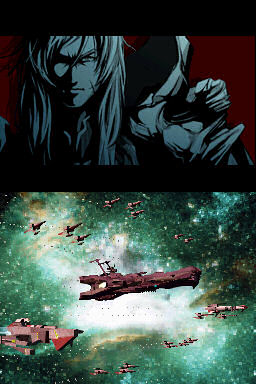 looking both ways to make sure no one was looking, I went over and cynically tried the puppy simulator. It was incredible; the dog looked amazingly lifelike, it was responsive, and you could do all sorts of cool things with it. Better still, it made excellent use of DS’s full capabilities: the touch screen, the microphone, the internal clock, even the wireless connectivity. The dog could be petted, it could respond to voice commands, it could grow hungry with time, and it could play with other players’ dogs. Released in the early cycle of the system, it was the portable’s first original blockbuster and is one of DS’s best games.
looking both ways to make sure no one was looking, I went over and cynically tried the puppy simulator. It was incredible; the dog looked amazingly lifelike, it was responsive, and you could do all sorts of cool things with it. Better still, it made excellent use of DS’s full capabilities: the touch screen, the microphone, the internal clock, even the wireless connectivity. The dog could be petted, it could respond to voice commands, it could grow hungry with time, and it could play with other players’ dogs. Released in the early cycle of the system, it was the portable’s first original blockbuster and is one of DS’s best games.
And just to also give props within my own subjective tastes, I’ll also throw out some love for Infinite Space. I grew up on space RPGs and not only is Infinite Space a great example of that, but it is one of the longest and deepest games on the little system. Dozens of planets, dozens of characters, an absurdly deep customization system, an emotional plot, and a truly compelling lead make for an unforgettable 40+ hour space opera. Rarely have I seen gaming moments as potent as the halfway point in that game; rarely has a game’s characters won me over with their heart and soul. Developers don’t make games like this anymore, but they did on DS, and the system is better for it.
James Stank
Odds are that I’m a big fan of every game that my fellow team members will name. However, there is indeed one DS game that I feel deserves the title of “Best on DS” more so than any other, and that game is Mario Kart DS. When it launched back in 2005, it was one of the main reasons to own a DS. It took everything we loved about Mario Kart, improved it, and added in online play for the first time ever. The graphics were beautiful, the gameplay was tight, and the competition was fierce.
As much as I love all of my other DS games, Chocobo Tales, Trace Memory, and Hotel Dusk included, none of them can truthfully compare to the monster that is Mario Kart DS. I doubt any DS game of mine has sucked up more of my life than Mario Kart. I know it seems like an unfair pick because sports games always have more replay value than any other type of game, but still… fun is what games are all about. And you can believe me, I have tons of it when I snake my way to victory in my Shooting Star car with Mario. The DS entry in the Mario Kart series may very well be the best there’s ever been, and I have high hopes for Mario Kart 3DS.
Andrew Hsieh
You know, I could’ve sworn nobody else shared my love for Nintendogs— Joshua proved me wrong, though. That’s pretty great. But that means now I have to come up with another game that I so deeply enjoy. (By the way, my own rationale for liking Nintendogs: not only did it give me something to do on typhoon days in Taiwan, but they contained puppies that wouldn’t pee, poo, or do other scary things that dogs normally do.)
And what is this? James has already extolled the virtues of Mario Kart DS? He would. Though that’s a great game too– my brother and I shared a DS between the two of us until very recently, and the only way we could play multiplayer games would be on Mario Kart DS, beating each other’s time trials over and over again until our times hit the stratosphere, beating staff members’ times while we were at it. Of course, looking at YouTube,there are plenty of people out there who are even faster. I guess that’s just what makes the game so appealing– there’s always a higher goal to strive for.
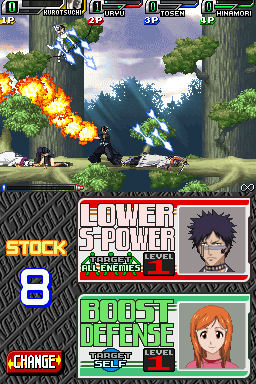 Okay, but it’s time to get unique here. I don’t know if they’re my absolute favorite games, but considering the sheer amount of time I’ve spent with Bleach: The Blade of Fate and its sequel, Bleach: Dark Souls, I think they’d have to be right up there. Now, full disclosure: I’m absolutely terrible at fighting games. Really, I couldn’t do a legitimate combo if my life depended on it. But here are two fighters that I can play– and despite the fact that they’re licensed games based on the popular anime series Bleach, they’re actually pretty darn awesome on their own merits. (That is, more Arkham Asylum than Superman 64.) This can probably be chalked up to the fact that Treasure, famous for Gunstar Heroes among other thumb-tappers, developed these games, and thus not only do you have all the merits of a fighter developed by, say, SNK or Capcom, but you also have the high-octane action that Treasure’s known for. Helping out sucky players like me is a combo tutorial for each character, teaching you some of the craziest combos around– and though they won’t be exactly original to anyone who’s gone through the tutorial, they’ll definitely give you at least a bit of an edge. Unfortunately, since I own the Japanese editions of both variants of these games, I never really had much of a smooth online experience– but playing against my ridiculously fighter-savvy brother was enough.
Okay, but it’s time to get unique here. I don’t know if they’re my absolute favorite games, but considering the sheer amount of time I’ve spent with Bleach: The Blade of Fate and its sequel, Bleach: Dark Souls, I think they’d have to be right up there. Now, full disclosure: I’m absolutely terrible at fighting games. Really, I couldn’t do a legitimate combo if my life depended on it. But here are two fighters that I can play– and despite the fact that they’re licensed games based on the popular anime series Bleach, they’re actually pretty darn awesome on their own merits. (That is, more Arkham Asylum than Superman 64.) This can probably be chalked up to the fact that Treasure, famous for Gunstar Heroes among other thumb-tappers, developed these games, and thus not only do you have all the merits of a fighter developed by, say, SNK or Capcom, but you also have the high-octane action that Treasure’s known for. Helping out sucky players like me is a combo tutorial for each character, teaching you some of the craziest combos around– and though they won’t be exactly original to anyone who’s gone through the tutorial, they’ll definitely give you at least a bit of an edge. Unfortunately, since I own the Japanese editions of both variants of these games, I never really had much of a smooth online experience– but playing against my ridiculously fighter-savvy brother was enough.
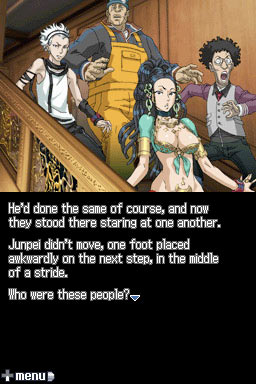 And while I enjoyed Hotel Dusk: Room 215, I think I’ve expressed my love for that game enough around these parts. The recently released 999: Nine Hours, Nine Persons, Nine Doors, though, is a game that doesn’t receive nearly enough love in the mainstream press. Here’s the premise of this horror-themed visual novel (because I know you don’t know about it): you’re trapped on a ship, and the only way you can get out is if you team up with eight other characters to go through a gauntlet of puzzles even Professor Layton would balk at. Not every character will get out– maybe nobody will. Oh, and there’s six multiple endings. (Suck on that, Kyle Hyde.)
And while I enjoyed Hotel Dusk: Room 215, I think I’ve expressed my love for that game enough around these parts. The recently released 999: Nine Hours, Nine Persons, Nine Doors, though, is a game that doesn’t receive nearly enough love in the mainstream press. Here’s the premise of this horror-themed visual novel (because I know you don’t know about it): you’re trapped on a ship, and the only way you can get out is if you team up with eight other characters to go through a gauntlet of puzzles even Professor Layton would balk at. Not every character will get out– maybe nobody will. Oh, and there’s six multiple endings. (Suck on that, Kyle Hyde.)
Now, while this may sound like a cheap way to get replay time out of your game, consider this: the game starts out with one decision that leads to two branching paths, which lead to three paths each, which lead to more paths and … well, you get the idea. What this means is that by and large the endings are not arbitrary, and in fact the journey to each one provides a whole plethora of information that will help you make decisions for your next playthrough. This also means that the story in 999 is absolutely crazy, but crazy in a great, makes-me-feel-tingly way. You need to play it. Just don’t make the mistake I did and play it right before going to bed.
Nicolas Vestre
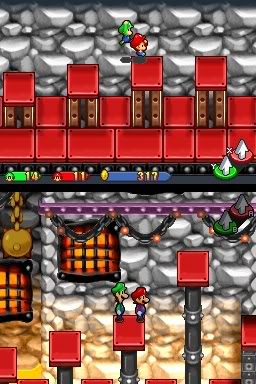 Mario & Luigi: Partners in Time was one of the first DS games that totally absorbed me. I couldn’t put it down for the life of me. The prospect of time traveling made the game exciting from the start. But things really started cooking when Mario and Luigi got totally crushed in battle, only to be saved by their much-younger selves! The excitement level went through the roof when I found out I’d had to fight (alongside my baby counterparts) against powerful, evil and malicious aliens known only as the Shroobs. Battle mechanics were improved and simplified from the first Mario & Luigi; no more overly complex acrobatic special moves, but instead, quirky and powerful battle items appeared, which were a cinch to use. Of course, the standard jump and hammer were used to cream enemies throughout the game, and with quick thinking and dexterity, just about every enemy attack can be avoided. Some critics commented that the story wasn’t quite as funny as the first entry in the series, but I completely disagree; the narrative in Partners in Time kept me glued to the screen for the entire game, laughing all throughout.
Mario & Luigi: Partners in Time was one of the first DS games that totally absorbed me. I couldn’t put it down for the life of me. The prospect of time traveling made the game exciting from the start. But things really started cooking when Mario and Luigi got totally crushed in battle, only to be saved by their much-younger selves! The excitement level went through the roof when I found out I’d had to fight (alongside my baby counterparts) against powerful, evil and malicious aliens known only as the Shroobs. Battle mechanics were improved and simplified from the first Mario & Luigi; no more overly complex acrobatic special moves, but instead, quirky and powerful battle items appeared, which were a cinch to use. Of course, the standard jump and hammer were used to cream enemies throughout the game, and with quick thinking and dexterity, just about every enemy attack can be avoided. Some critics commented that the story wasn’t quite as funny as the first entry in the series, but I completely disagree; the narrative in Partners in Time kept me glued to the screen for the entire game, laughing all throughout.
Mario & Luigi: Bowser’s Inside Story provided one of the most bizarre, innovative and awesome concepts I’ve ever experienced in a video game: most of the quest takes place in your archenemy’s belly! In addition, Bowser, King of the Koopas, is playable for a large portion of the game, and let me tell you, controlling him is an absolute blast. With Fawful as the villain, the laughs are endless. For example, once Bowser realizes that his castle is stolen, he launches a good ol’ Banzai Bill at it. Later on, Fawful actually invites him over for a gargantuan feast, which causes King Koopa to blimp out to immense proportions. The humor keeps on coming, just like the previous games in the series.
But let’s not forget Mario and Luigi– they’re definitely here too, helping Bowser behind the scenes all the way. Few events are as odd or captivating as what our heroes find deep in Bowser’s innards. The inner-workings of battle are superb (for both Boswer and the plumber duo), as everything can be parried or dodged with skill; and the armor and badge system is elegant, allowing for a great deal of customization, even more so than previous entries. As is the case with excellent games, the rare quality exists where the experience captivates the player to the exclusion of everything else. Bowser’s Inside Story definitely has the globin to be with the best of what DS has to offer.
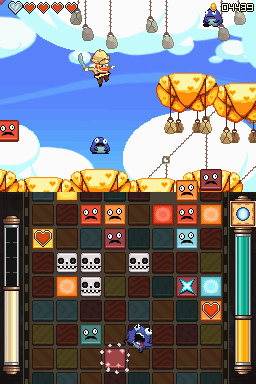 Few, if any, of DS games combine two genres so seamlessly as what Henry Hatsworth in the Puzzling Adventure has brilliantly accomplished. The touch screen features the Puzzle Realm, which is like Planet Puzzle League or Tetris Attack on steroids. Solving puzzles on the bottom screen can make platforms appear for Henry, or just give him more power to use special moves. In tricky situations, the Puzzle Realm can give Hatsworth enough strength to don the near-invincible Robot Suit, which obliterates everything in its path with its awesomeness.
Few, if any, of DS games combine two genres so seamlessly as what Henry Hatsworth in the Puzzling Adventure has brilliantly accomplished. The touch screen features the Puzzle Realm, which is like Planet Puzzle League or Tetris Attack on steroids. Solving puzzles on the bottom screen can make platforms appear for Henry, or just give him more power to use special moves. In tricky situations, the Puzzle Realm can give Hatsworth enough strength to don the near-invincible Robot Suit, which obliterates everything in its path with its awesomeness.
However, especially when a boss is involved, the blocks on the touch screen become much more diverse and make for an excellent and challenging experience. The platforming is so awesome, with dashing and wall jumps like that found in Mega Man X, that it could be sold as a package totally separate of the Puzzle Realm, and it would still be great; likewise, the Puzzle Realm could almost stand on its own. But combine these two worlds, and you get something very special.
Like any superb platformer, there’s a shop at which to buy everything conceivable, even an upgrade that rewards Henry for taking damage. Then there are the secret levels that you might never find without the help of the Internet. These levels will push you to the limit, and sometimes have really cool upgrades. Humor is a central theme in Henry Hatsworth, and it also adds richly to the experience. The difficulty might be off-putting to some, but anyone who ventures to the end and finds the secrets will be rewarded with one of the best experiences on DS.
Kevin Knezevic
Like Andy, I will have to nominate Pokémon HeartGold and SoulSilver as among the very best titles in DS’s library. My reasons are only partly fueled by nostalgia: Johto has always been my favorite region in the Pokémon series, and it has been beautifully recreated in this pair of remakes. Not only do HeartGold and SoulSilver preserve the feel of the originals, but they expand upon them by integrating all of the trappings found in the modern-day Pokémon titles, making them (at least until the release of Black and White) the absolute pinnacle of the series. There’s an almost-overwhelming amount of content in these titles, too, and it is really easy to sink hundreds of hours into them without exhausting all of their fun. In terms of depth and sheer longevity, these two are in a class of their own, and that is why, despite being remakes, they deserve to be counted among DS’s best.
Mario Kart DS, as many others have already pointed out, is another requisite answer. The title is largely considered the best entry in its series, and it is easy to see why: not only does it feature some of the best course designs (both new and old) the series has ever seen, but it expands greatly on the single-player side of things by introducing various missions to complete as well as giving gamers the ability to play battle mode against bots. This latter feature in particular is really quite neat, and I often find myself turning the game on just to play some solo balloon battles whenever I have spare time. That the title was released in 2005 and is still among my most played DS games is a testament to its excellence, and it, perhaps more than any other, deserves to be on this list.
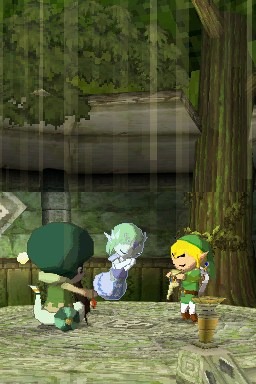 There are certainly many other games worthy of mention, but one final title especially deserving of commendation is The Legend of Zelda: Spirit Tracks. I was, admittedly, a little apprehensive of the game when it was first announced, thinking it nothing more than a Phantom Hourglass redux save with an even more limited mode of transportation. The more I learned of it, however, the more I grew to anticipate it, and I can safely say the final product allayed any and all of my fears: not only is the train better integrated into the game’s design than the steamship was, but it is simply much more fun to control in general.
There are certainly many other games worthy of mention, but one final title especially deserving of commendation is The Legend of Zelda: Spirit Tracks. I was, admittedly, a little apprehensive of the game when it was first announced, thinking it nothing more than a Phantom Hourglass redux save with an even more limited mode of transportation. The more I learned of it, however, the more I grew to anticipate it, and I can safely say the final product allayed any and all of my fears: not only is the train better integrated into the game’s design than the steamship was, but it is simply much more fun to control in general.
Like in Phantom Hourglass, you draw a path for your vehicle on the touch screen, but now you must manually control it by adjusting its speed and direction with a lever on the side. This makes it feel like you really are the conductor of a train, and it makes traveling between the areas of Hyrule much more fun.
The highlight of the game, however, is its puzzles, which are some of the most deviously clever in the series. Including Princess Zelda (as a phantom knight, no less) was a stroke of brilliance, and having to control her in tandem with Link to progress through the Spirit Tower provided some mind-bending challenges the series has of late lacked.
M. Noah Ward
Oh, man. There are so many games I want to mention. There are even still more games I’ve not yet played, like GTA: Chinatown Wars, the Mario & Luigi games, the Advance Wars games or a vast number of RPGs I never got, any number of which could have shown up here in my favorites. But, thankfully, several of those games were covered above by my good fellows here, so I shouldn’t feel too bad. So, I’ll focus on my favorites that caused my free time/personal life to stop for: namely, anything Layton, Ace Attorney or Zelda.
The catch on Zelda is that I’m a hardcore handheld Zelda game fan. I do not have the same fervor for console Zelda games– I’m not sure why, but other than Majora’s Mask and The Adventure of Link, none of the other Zelda games captured my heart as much as any of the handheld Zeldas I’ve played. Even when I tried A Link to the Past on GBA it didn’t work for me. So, forced to choose between two very great, original options on DS, I’ll definitely go with Spirit Tracks, as it seemed the pinnacle of Zelda handheld games thus far. Princess Zelda was actually an integral part of the story and companion throughout the game, unlocking train tracks and battling fiends from your locomotive was addictive, and the ending was unexpectedly memorable given I was expecting a simple “the end.” And, oh, that song that plays while you’re in the train– it’s in my top 3 of Zelda tunes.
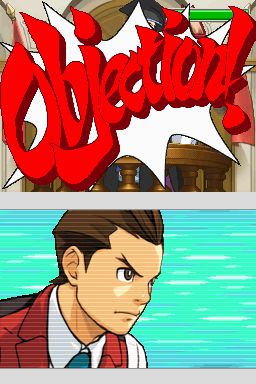 The Ace Attorney series is also an all-time favorite. I love the characters, the court room setting, the logic puzzles and the surprisingly lengthy and twisting mysteries. That everything’s tied together by complex over-arching storylines makes the experience even more high-shelf, and whether I’m playing Phoenix, Apollo or Miles, I know I’m always in for a great time. The question is which game to pick as my favorite? That’d be Apollo Justice, narrowly beating out the third Phoenix game, Trials & Tribulations. I can make a stronger recommendation for Apollo over Trials since you can’t jump into Trials and appreciate its epic nature and incredible wrap-up without having experienced the first two Phoenix games. Apollo, on the other hand, has ties back to the Phoenix games but is still self contained, has its own great characters, mysteries and supernatural twists, and, as a DS original, uses DS’s functionality more than the Phoenix games which were GBA ports.
The Ace Attorney series is also an all-time favorite. I love the characters, the court room setting, the logic puzzles and the surprisingly lengthy and twisting mysteries. That everything’s tied together by complex over-arching storylines makes the experience even more high-shelf, and whether I’m playing Phoenix, Apollo or Miles, I know I’m always in for a great time. The question is which game to pick as my favorite? That’d be Apollo Justice, narrowly beating out the third Phoenix game, Trials & Tribulations. I can make a stronger recommendation for Apollo over Trials since you can’t jump into Trials and appreciate its epic nature and incredible wrap-up without having experienced the first two Phoenix games. Apollo, on the other hand, has ties back to the Phoenix games but is still self contained, has its own great characters, mysteries and supernatural twists, and, as a DS original, uses DS’s functionality more than the Phoenix games which were GBA ports.
And then there’s my third favorite series, Professor Layton. A paragon of intelligence and ettiquette that aren’t too common in today’s world, Professor Layton is a fantastic character in his own right, but the sci-fi tinged world he solves his addictive brain teasers in (with plucky apprentice Luke) is something you never want to leave, especially with its gorgeous Euro-styled art and music. That a series of brainteasers can be wrapped up within twisting mysteries that actually have emotional heft is even more remarkable. They’re not always as funny as Ace Attorney games (they do have chuckle-worthy moments), but their stories are still just as good, and, even better, Level-5 gives a plethora of additional content, brainteasers and rewards after you finish the main game, something the Ace Attorney team still has yet to match. As with Ace Attorney, I honestly recommend the entire series, but forced to pick I will choose Layton #3, that is Professor Layton and the Unwound Future. This is more from a series fan perspective, though, since it is a moving, bittersweet ending to the original trilogy and has the most fantastical, humanity-threatening villain yet. It also has the sharpest presentation and most puzzles out of all three. But don’t let that discourage you: start with the first game, Curious Village. You will feel well-rewarded.
With this many selections we might have named several of your favorites. Or maybe not? Let us know in the comments below.




 ShareThis
ShareThis






